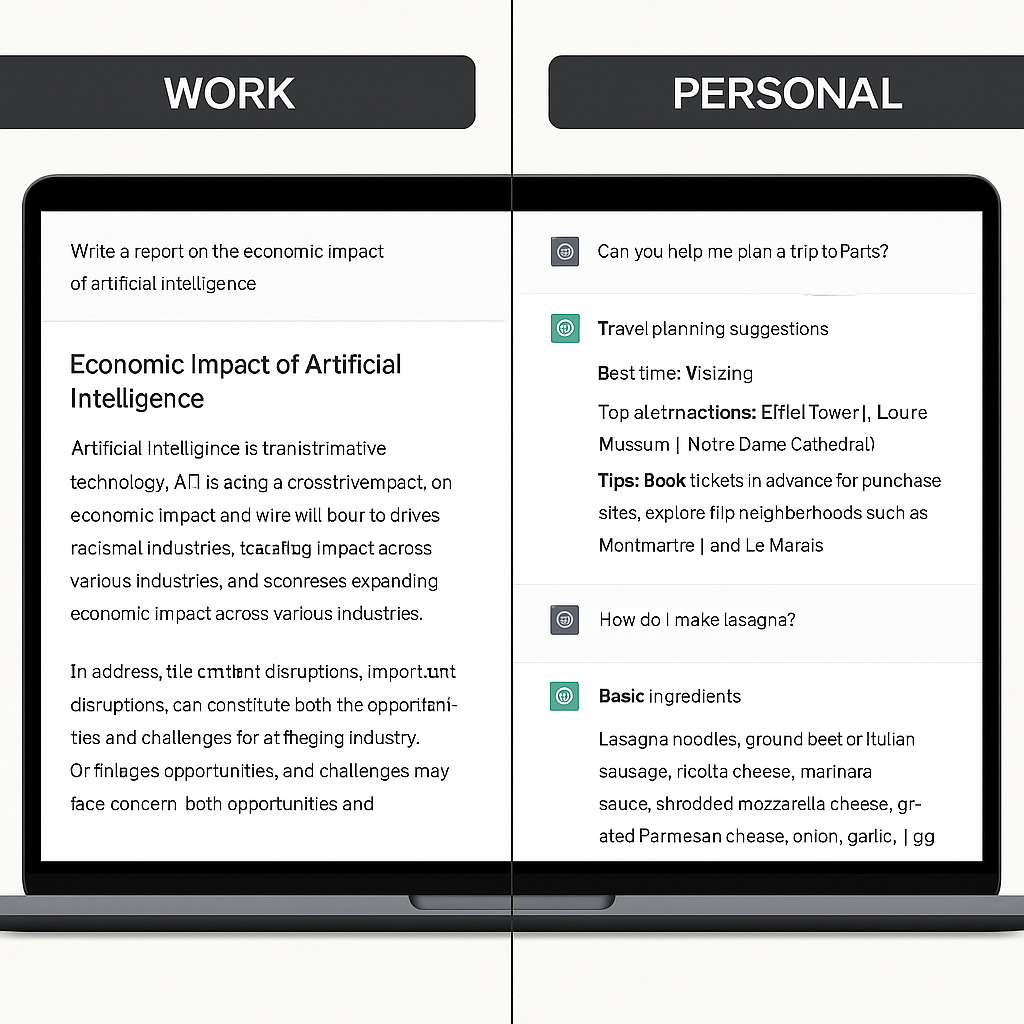OpenAI, in collaboration with Harvard economist David Deming, has released the most comprehensive study to date on how people use ChatGPT. Based on 1.5 million anonymised consumer conversations, the research reveals that ChatGPT is no longer the preserve of early adopters or knowledge workers. Instead, it is becoming an everyday tool for a growing global user base, now reaching 800 million weekly active users.
That scale places ChatGPT among the most widely used digital platforms globally. As usage broadens, so too does the role it plays in how people access information, complete tasks, and make decisions. For marketers and digital leaders, these shifts point to new patterns in digital behaviour that are likely to shape future content, customer engagement, and brand discovery.
Usage Is Becoming Mainstream and Representative
One of the standout findings from the study is the rapid shift in who is using ChatGPT. The gender gap that characterised early adoption has largely closed. In January 2024, just 37% of users had typically feminine names. By July 2025, that figure had risen to 52%, aligning closely with the broader adult population.
The platform’s growth is also geographically diverse, with significant uptake in both developed and emerging markets. While not the core focus of this study, the 800 million weekly users represent a mix of geographies, demographics, and digital maturity levels. This further reinforces the view that generative AI is entering the digital mainstream.
Work and Everyday Use Are Intertwined
Despite the enterprise focus often associated with AI, consumer use of ChatGPT is primarily personal. According to the data, 70% of usage is non-work-related, with the remaining 30% tied to professional tasks. This balance is key. It suggests that ChatGPT is not just a workplace productivity tool. It is a broader utility that supports everyday decision-making, communication, and task execution.
Three main use patterns emerge:
-
Asking (49%): Users seek explanations, advice, or general information
-
Doing (40%): Activity includes drafting, planning, or creating outputs, often related to work or personal productivity
-
Expressing (11%): More exploratory or creative uses, including reflection, ideation, or play
Writing is by far the most common use case, particularly in work settings. Coding and creative exploration, while visible in industry commentary, remain comparatively niche in terms of volume.
This blend of professional and personal use places ChatGPT in a similar category to search engines or mobile apps. These are tools that span multiple parts of a user’s day and influence behaviour both inside and outside of work.
ChatGPT as a Decision-Support Tool
One of the more strategic insights from the report is ChatGPT’s growing role in decision support. Users are not only asking factual questions or outsourcing basic tasks. Increasingly, they are using the model to help structure thinking, explore options, and clarify next steps.
This is particularly relevant for marketers. As AI becomes a go-to source for research and guidance, it may start to compete with, or even replace, traditional sources of information. Consumers may no longer begin a decision journey with a search engine, brand website, or product review. They may start with a prompt to ChatGPT.
That shift has implications for content visibility, brand messaging, and the structure of digital experiences more broadly.
Strategic Implications for Marketers
The study’s findings point to several developments that should inform marketing and digital strategy in the months ahead.
1. Content Must Be AI-Ready
With 800 million weekly users increasingly turning to ChatGPT to interpret and summarise content, marketers must ensure their materials are structured, accurate, and easy to parse. Messaging that relies on nuance, emotion, or complex storytelling may be lost or distorted when filtered through AI.
Creating content that performs well in conversational contexts, factually clear, directly helpful, and built for summarisation, will be a growing priority.
2. Generative Search Is Reshaping Discovery
If consumers start with an AI assistant rather than a search engine, the discovery process changes. Rather than clicking through ads or scanning organic listings, users are receiving direct summaries or recommendations from the model itself.
This does not render SEO obsolete. It does expand the optimisation landscape. Brands will need to consider how their content appears in AI-generated outputs and invest in strategies to surface trusted, relevant material within those interactions.
3. Everyday Use Drives New Expectations
Because the majority of usage is personal, consumers are forming a different type of relationship with AI. It is informal, immediate, and expectation-led. People want fast, clear answers. That expectation may bleed into how they engage with other digital touchpoints, from websites to ads to customer service.
Marketers may need to rethink tone, format, and delivery across digital content to align with this new standard of interaction.
Looking Ahead
ChatGPT’s weekly user base of 800 million, coupled with strong growth across non-work use cases, signals that generative AI is now part of the broader digital infrastructure. Like mobile, search, or social before it, ChatGPT is becoming a background layer in how people communicate, explore, and make decisions.
For brands, the takeaway is not just about integrating AI into internal workflows. It is about recognising how AI is already shaping the customer journey. As more consumers rely on tools like ChatGPT to simplify complexity and support decisions, marketers must ensure their content and experiences are fit for this new environment.
The challenge ahead lies in meeting audiences where they already are, inside tools like ChatGPT, and ensuring the brand is represented clearly, accurately, and usefully in those contexts.




RECOMMENDED FOR YOU
Google Rebuilds Checkout For AI Shopping
Agentic shopping has moved from theory to reality, and…
Agentic shopping has moved from theory to reality, and…
LinkedIn Reveals Jobs On The Rise 2026
LinkedIn has released its latest Jobs on the Rise…
LinkedIn has released its latest Jobs on the Rise…
Google AI To Power Apple’s Siri
Apple has officially teamed up with Google in a…
Apple has officially teamed up with Google in a…